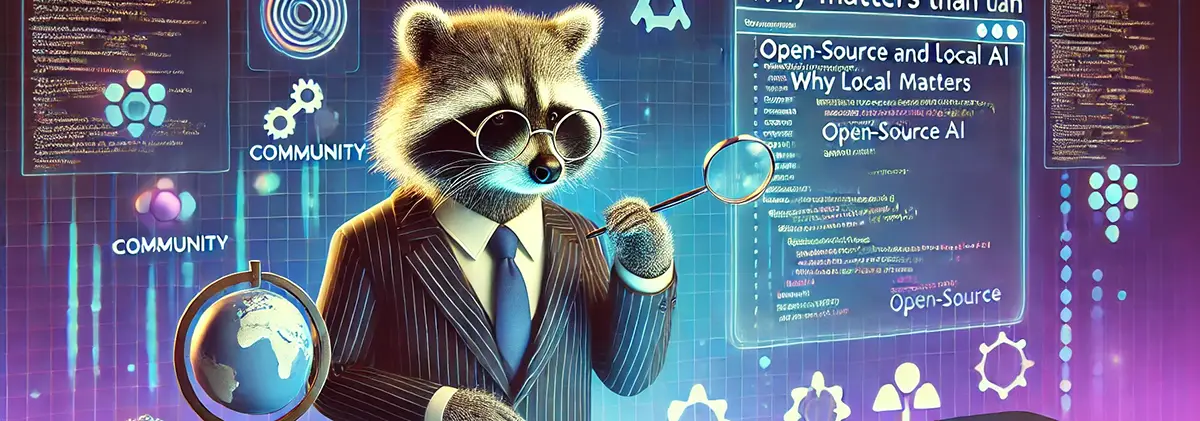As artificial intelligence continues to advance, the vision of AI that can operate entirely on local devices—smartphones, laptops, or personal servers—becomes increasingly feasible. Today, robust language models (LLMs) and reasoning models already demonstrate impressive capabilities, from text generation to complex problem-solving. But as powerful as these cloud-based AI solutions are, there’s an emerging demand for a new type of AI: one that stays local, respects privacy, and still delivers the power of the latest advancements.
The Rise of Local AI Models: A Transformation in Privacy and Functionality
The core issue with most modern AI models is the need to connect with external servers to process data. While some platforms assure data privacy, the growing number of corporate and personal users hesitant to send sensitive information to cloud-based services signals a shift in the industry. The future lies in “local-first” AI that operates entirely on the user’s own device, safeguarding data without compromising AI quality.
At the forefront of this shift are open-source models like Meta's LLama. Introduced as a high-performing, open-access alternative to closed-source models like OpenAI's GPT series, LLama showcases how local models can deliver strong capabilities without constant cloud dependency. LLama’s ongoing development is encouraging a wave of open-source innovations, pushing the boundaries of what local AI can achieve.

Open Source and Local AI: Why Local Matters More than Ever
Open-source AI models like LLama are designed with accessibility and transparency in mind. This means developers and companies can access the full codebase, modify it to suit their needs, and run it locally—all without relying on centralized servers or being restricted by proprietary limitations. Open-source platforms, supported by companies like Meta, have democratized access to high-quality AI models and are actively shaping a future where users have full control over their AI interactions.
The development of local models not only enhances privacy but also fosters flexibility and adaptability. A local AI can be customized and fine-tuned to fit individual or organizational requirements, providing personalized responses and functionalities that align with specific use cases. This makes local AI a potentially transformative technology for industries handling highly sensitive data, from healthcare to finance to government.

The Privacy Advantage: Protecting Sensitive Data with Local AI Models
One of the most compelling reasons to advocate for local AI models is the unparalleled level of privacy they offer. Even in cases where cloud-based providers promise data security, there remains a fundamental concern about the storage and potential misuse of personal or corporate data. With local models, all processing happens on-device, removing the need to transmit data externally. This has two major advantages:
-
Elimination of Data Transmission Risks: Local AI eliminates the security risks associated with data transmission to external servers, which can be vulnerable to interception, hacking, or unauthorized access.
-
Enhanced Compliance with Privacy Regulations: For organizations subject to stringent data regulations like GDPR or HIPAA, local AI offers a path to compliance by keeping data within the physical premises or secure environments. This is crucial for businesses that need to ensure absolute control over sensitive information.
For example, a local AI assistant could analyze a company’s internal emails, schedule meetings, and even respond to queries—all without any data leaving the organization’s private network. This offers businesses peace of mind and ensures that sensitive information is handled responsibly.

Real-World Applications for Local AI Models
Local AI models unlock possibilities that go beyond simple convenience—they enable capabilities that would otherwise be too risky or impractical with cloud-based AI. Here are some transformative use cases:
Real-Time Speech-to-Text and Translation with LLM Integration
Imagine a real-time assistant capable of converting speech to text, analyzing that text with a large language model, and then providing immediate feedback—all without ever reaching the cloud. This could be revolutionary for industries such as customer service, where privacy and response time are paramount. A local AI could not only transcribe conversations but also offer contextually relevant responses, greatly enhancing customer satisfaction and operational efficiency.
Personalized Email and Document Management
A local AI model could analyze incoming emails, categorize and prioritize them, and even draft responses based on previous conversations—all while keeping every single byte of data local to your device. This level of automation without sacrificing privacy is ideal for professionals managing large volumes of communication, where sensitive data like client information or proprietary insights must remain confidential.
Enhanced Personal Assistant and Scheduling Tools
Local AI could revolutionize personal productivity by acting as a smart assistant that tracks schedules, sets reminders, and adapts to individual workflows. Unlike typical digital assistants that rely on cloud processing, a local AI assistant can deliver similar functionality offline, allowing users to maintain a high degree of control over their data.
Corporate Knowledge Management and Onboarding
In business settings, a local AI model could serve as a powerful internal resource, sifting through documents, providing answers based on corporate data, and assisting with employee onboarding—all while maintaining strict confidentiality. By housing the AI on a company server, organizations can leverage AI-driven insights without exposing internal data to third-party servers.

The Technological Path Forward: Making Local AI a Reality
The journey to efficient local AI models involves addressing a few core challenges: computational resources, model size, and adaptability. To run effectively on local devices, AI models must become leaner without sacrificing functionality. Meta's LLama model is a promising step in this direction, showcasing that large language models can be optimized for smaller, on-device operations without substantial performance loss.
Advances in hardware, such as specialized AI chips, and software optimization techniques are making it increasingly feasible for smaller devices to host AI models. Furthermore, frameworks like TensorFlow Lite and ONNX are enabling developers to deploy AI models on various devices, from smartphones to edge servers, broadening the scope for local AI applications. Especially thanks to the increasing support and optimizations on CPUs and GPUs and some specific NPUs we can run better models with a way higher performance. Just like GPUs made 3D possible on any computer in the 90s which was nearly impossible with a CPU alone, we will see such advancements for AI soon too.
Embracing a Future Where AI is Personalized, Private, and Local
The local-first AI model not only has privacy benefits but also stands to reduce reliance on bandwidth and connectivity, making advanced AI available to more users in more regions, especially where network infrastructure is limited. With a global shift toward privacy-conscious technology, local AI offers a sustainable path forward that aligns with user demands and regulatory pressures. How awesome is that? Having your personal assistant always by your side who knows basically everything and doesn't need internet for this and works with you completely locally.
Embracing the Local AI Revolution
The future of AI is set to be decentralized, privacy-preserving, and highly efficient. Local AI models have the potential to reshape our interactions with technology, empowering users and businesses with unparalleled control over their data. Whether in the form of personal assistants, document analyzers, or real-time language processors, the benefits of local AI are clear and compelling.
At Neoground, we are excited about the possibilities that local AI holds for privacy-conscious innovation. With our AI consulting and digital strategies, we are helping clients navigate this new era of AI, finding solutions that balance efficiency, security, and future-readiness. And of course we also use such solutions in our own software. We're looking forward to soon have only local, own AIs with high privacy standards and no 3rd party dependencies.
Ready to explore how local AI can benefit your business? Contact Neoground to start your journey towards secure, private AI that puts you in control. Let's create a future where technology works for you—securely and efficiently, all on your terms.
This article and all images were created by us with the support of Artificial Intelligence (GPT-4o).
All images are AI-generated by us using DALL-E 3.




Noch keine Kommentare
Kommentar hinzufügen